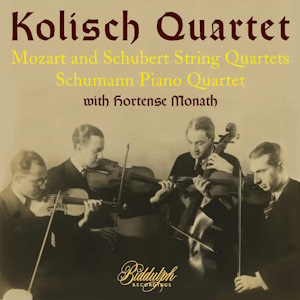
Kolisch Quartet
Hortsense Monath (piano)
John Barrows and Domenico Caputo (French horns)
rec. 1934-37
Biddulph 85051-2 [2 CDs: 153]
The pre-war recordings of the Kolisch Quartet haven’t been neglected by today’s labels though they’ve not been ubiquitous by any means. If you have Symposium 134 or Archiphon ARC108 you’ll find some of that legacy, though by far the most focused look at Kolisch came from Music & Arts in their 6-CD set ‘In Honor of Rudolf Kolisch’ (CD-1056) which contained the 1936-37 Schoenberg Quartet recordings as well as post-war recordings made by the Kolisch, or the Pro Arte Quartet, of which he was a member. Kolisch was Schoenberg’s brother-in-law, had studied with him, and was to propagate his music alongside that of Webern, Berg and Bartók amongst others. This makes Biddulph’s twofer, containing Mozart, Schubert and Schumann recordings recorded in 1934 and 1937 all the more valuable for its focus exclusively on the Austro-German, Central European classics of the repertoire.
There are two Mozart Quartets in the first disc, K.575 and K.589. The Kolisch was a quintessentially elegant Viennese ensemble, which might surprise those who have only heard its fearsome espousal of Schoenberg’s quartets. There’s a refined precision in the playing of the two violinists, Kolisch and Felix Khuner, and a modesty in the playing of violist Eugen Lehner. In cellist Benar Heifetz (no relation to Jascha) the group had a particularly expressive player and he’s the one who plays out the most strongly and eloquently. The quartet wasn’t renowned necessarily for its dapper qualities – though this may derive from the repertoire they chose to promote – but the finale of K.575 is genuinely dapper. The B flat Quartet K.589 was recorded three years later, in 1937, and is commendable clear with an unsentimentalised formality in the Larghetto and a lithe way in the finale. It’s audibly the case that Heifetz, who also recorded the Schubert Quintet with the Budapest Quartet, is by some way the most expressive and ear-catching tonalist of the four.
Most quartets of the time took two 78 sides over Schubert’s Quartettsatz but not the Kolisch who take just the one with predictably zany results – this is the most helter-skelter, bizarrely fast version I’ve come across. Only some of the lyric grace of the music survives this travesty. Much better to pass on to the recording of the String Quartet in A minor, D.804 ‘Rosamunde’ which was actually recorded at the same sessions as the Quartettsatz. Tempi here match those of the London String Quartet in their Library of Congress live recording a few years later and, more to the point, the playing is sympathetic and resilient. Again, it’s Heifetz who provides the timbral buttressing the group needed, not least in the finale.
The second disc leads with the Quartet in G major, D.887 which tends to offer whipped cream where the Busch Quartet offered drama. The essentially light tone of the Kolisch is nevertheless attractive though they still had to forgo the dacapo of the Scherzo – I believe that on the noisier Symposium transfer, the remastering ‘reinstated’ the dacapo by replaying it. The Scherzo does have a truly gemütlich lilt and the Mozartian finale is deftly pointed.
Schumann’s Piano Quartet, Op.47 dates from a session in November 1937 with pianist Hortense Monath, a concert artist more famous perhaps for shepherding the subscription series called New Friends of Music which over sixteen seasons promoted cutting edge repertoire and classics alike. This recording has largely been squeezed out of the collective memory but it’s a fine one with Monath acquitting herself well though the corporate sonority of the ensemble is lacking a little from time to time, most noticeably in the slow movement. This leaves just Mozart’s Ein musikalischer Spass with French horn players John Barrows and Domenico Caputo delighting in what must be one of the drollest and Jack Benny-like performance on disc.
My review copy suffered a blip – CD 1 was actually CD 2 and therefore CD 2 was CD 1– but yours won’t suffer this, as I’ve been assured by Biddulph that the commercially available copies will all be fine.
The extensive and excellent notes are by Wayne Kiley. Ray Edwards was the transfer engineer and carried out the digital mastering and he’s done a fine job. The Kolisch Quartet’s legacy is in the best of hands here.
Jonathan Woolf
Buying this recording via a link below generates revenue for MWI, which helps the site remain free


Contents
Wolfgang Amadeus Mozart (1756-1791)
String Quartet in D, K.575(1790)
String Quartet in B flat, K.589 (1790)
Ein musikalischer Spass (A Musical Joke), K.522 (1787)
Franz Schubert (1797-1828)
Quartettsatz in C minor, D.703 (1820)
String Quartet in A minor, D.804 ‘Rosamunde’ (1824)
String Quartet in G major, D.887 (1826)
Robert Schumann (1810-1856)
Piano Quartet in E flat, Op.47 (1842)
















